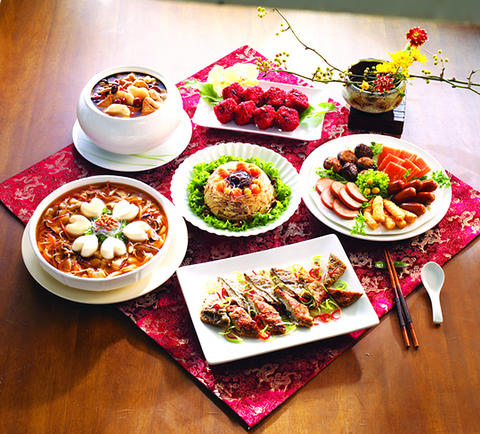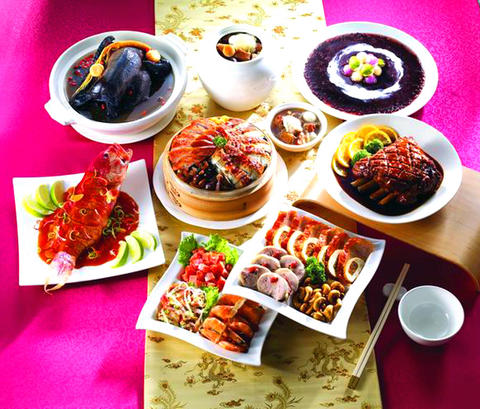The Lunar New Year has many traditions associated with it, and while many of these are gradually being thrown out the window by a generation too preoccupied to bother, the New Year's Eve family dinner remains entrenched in Taiwanese society. All kinds of dishes, many of them bad for the waistline and blood pressure, are essential to see in the New Year properly, for, as we are told, each dish has important symbolic significance.
The first dish on a New Year's Eve menu is often a cold mixed platter, usually with a choice of five types of food. Regularly to be seen are haizhepi (海哲皮), shrimp, stewed beef, tripe and cold-cuts of chicken. It's the number of choices rather than what's on the plate that is significant in this case. This dish is a reference to the phrase "may you be granted the five blessing" (五福臨門, wufulinmen), a commonly used auspicious saying. There is some debate as to exactly what the five blessings are, but the most commonly accepted version includes longevity, prosperity, official status, joy and numerous offspring.
Fish is an absolute must at the New Year's Eve table, largely because of a homophone. The word fish (魚, yu) sounds the same as "surplus" (餘, yu), so the eating of fish represents the hope that the following year will be one of abundance. The type of fish and the manner in which it is cooked are left to the discretion of the chef.

PHOTO COURTESY OF PRESIDENT CONVENIENCE STORES
A whole chicken is also often thought a necessary part of the meal. This is partly due to a kind of rhyming aphorism in Hoklo (commonly known as Taiwanese), "Eat a chicken, establish a home" (吃雞起家, chiah ke, khi ke), which doesn't make a lot of sense in English when translated directly, but given that the holiday is a time for families to get together, the concept of family unity can be read into almost anything. (Meatballs are another popular way of expressing this in the language of food, simply because they are round.) The use of specially bred black-boned chickens gives the dish additional cachet, as this variety is thought to have medicinal properties that will fortify the body against winter weather.
Fortunately, given the excess of fish and meat that is served up at most Lunar New Year's Eve dinners, a number of vegetables also have auspicious references.
Mustard greens are commonly consumed during the holiday because in Chinese they are called "long years vegetable" (長年菜, changniancai), an auspicious reference to living to a ripe old age.

PHOTO COURTESY OF PRESIDENT CONVENIENCE STORES
Fat choy (髮菜), also known as hair moss (Latin name: Nostoc flagelliforme), a dried fungus harvested in the high deserts of Central Asia, is another common food. It's expensive, adding a certain prestige, but the main reason for its inclusion is that in Cantonese, the name of the vegetable is a homophone for "get rich," which is presumably what everybody is hoping to do as soon as the festivities are over.
It's not only expensive foods that make the cut; the radish is also traditionally part of the meal. In Hoklo, radish (菜頭, chhai-thau) is a homophone for "good fortune" (好彩頭 ho-chhai-thau). To ensure that the radish isn't embarrassed because of its humble origins, it's often served as radish cake, which dresses the vegetable up with shrimp, dried mushrooms and other more costly ingredients.
These are just some of the associations between food and folklore that are brought to the fore over the Lunar New Year, but the ultimate demand is that the food be exotic and varied. For this reason, one of the most popular choices is the dish "Buddha jumps over the wall" (佛跳牆, fotiaoqiang), a Minnan (閩南) stew or soup made of quail eggs, bamboo shoots, scallops, sea cucumbers, abalone, shark fin, chicken, ham, pork tendon, ginseng, mushrooms and taro, all cooked in a wine-based soup. It got its name from a story in which a Buddhist monk forgot his vows (which include not eating meat) and jumped over a garden wall to get a taste of this dish. The concoction comes in many forms and ranges in price from a few hundred NT dollars to many thousands. This show-off stew has no particular traditional relationship with the Lunar New Year other than providing almost limitless opportunities for the addition of pricey and exotic ingredients.
Preparing all of this food entails a good deal of cooking, and few families in urban centers have time to make such elaborate preparations. According to a study commissioned by the President Chain Stores (統一超商), which operates the 7-Eleven convenience store franchise, 75 percent of families in Taiwan now get takeout for New Year's Eve. The company has responded, as has virtually every other convenience store and hypermarket chain, with a huge selection of pre-ordered, pre-cooked and pre-packaged banquets. Restaurants, too, are currently accepting bookings and takeout orders for New Year's Eve foods and if you are looking to celebrate in traditional style without the hassle of cooking yourself, you should probably start getting your orders in now.

Towering high above Taiwan’s capital city at 508 meters, Taipei 101 dominates the skyline. The earthquake-proof skyscraper of steel and glass has captured the imagination of professional rock climber Alex Honnold for more than a decade. Tomorrow morning, he will climb it in his signature free solo style — without ropes or protective equipment. And Netflix will broadcast it — live. The event’s announcement has drawn both excitement and trepidation, as well as some concerns over the ethical implications of attempting such a high-risk endeavor on live broadcast. Many have questioned Honnold’s desire to continues his free-solo climbs now that he’s a

As Taiwan’s second most populous city, Taichung looms large in the electoral map. Taiwanese political commentators describe it — along with neighboring Changhua County — as Taiwan’s “swing states” (搖擺州), which is a curious direct borrowing from American election terminology. In the early post-Martial Law era, Taichung was referred to as a “desert of democracy” because while the Democratic Progressive Party (DPP) was winning elections in the north and south, Taichung remained staunchly loyal to the Chinese Nationalist Party (KMT). That changed over time, but in both Changhua and Taichung, the DPP still suffers from a “one-term curse,” with the

Lines between cop and criminal get murky in Joe Carnahan’s The Rip, a crime thriller set across one foggy Miami night, starring Matt Damon and Ben Affleck. Damon and Affleck, of course, are so closely associated with Boston — most recently they produced the 2024 heist movie The Instigators there — that a detour to South Florida puts them, a little awkwardly, in an entirely different movie landscape. This is Miami Vice territory or Elmore Leonard Land, not Southie or The Town. In The Rip, they play Miami narcotics officers who come upon a cartel stash house that Lt. Dane Dumars (Damon)

Jan. 26 to Feb. 1 Nearly 90 years after it was last recorded, the Basay language was taught in a classroom for the first time in September last year. Over the following three months, students learned its sounds along with the customs and folktales of the Ketagalan people, who once spoke it across northern Taiwan. Although each Ketagalan settlement had its own language, Basay functioned as a common trade language. By the late 19th century, it had largely fallen out of daily use as speakers shifted to Hoklo (commonly known as Taiwanese), surviving only in fragments remembered by the elderly. In